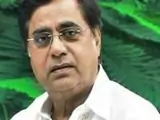|
A soulful journey...
Millions of music connoisseurs and Jagjit Singh fans have been longing to learn more personally and intimately about the man who revolutionized Ghazal (Urdu poetry with the Soulful Blend of own composed Music) composition and singing.
What is the story of his rise? What are the trials and tribulations he faced? What is the secret of his longevity at the summit of the Ghazal rendition genre for more than 25 years? How do his peers rate him? What kind of musical and human qualities have made him a household name and such a revered figure all over the Indian subcontinent?
Roots
Jagjit was born in 1941 to simple parents in Sriganganagar, Rajasthan. Actually named Jagmohan at birth, his devout Sikh father rechristened him Jagjit on the advice of his Namdhari guru. Jagjit's early years were spent in Bikaner, where his father was posted as a public works department employee. "We were a lower middle class family, not at all well off ... buying kites was a luxury ... radios too were a luxury ... we used to study by the light of lanterns because there was no electricity in the house ... we had no running water".
The Sikh religion accords a very high place to classical music. On returning to his birthplace in 1948, Jagjit's father got him to train under a blind teacher, Pandit Chhaganlal Sharma, and later, under Ustad Jamal Khan of the Senia gharaana (a school of traditional Hindustani music). Still a child, Jagjit sang shabads (devotional Sikh hymns) in Gurdwaras and processions on birthdays of the Sikh gurus. "From that time, I had a taste for lyrics with the melancholy flavor of parting and separation." Jagjit's first public performance came in the ninth grade. "When I sang there was great excitement! Some gave me five rupees, some two, and called out their encouragement." There was no looking back after that.
At college in Sriganganagar, he sang one night in front of 4,000 people. Suddenly, the electricity went off and the entire arena was plunged into darkness. The sound system was battery-operated and remained live. "I went on singing, nobody moved, nothing stirred ... such incidents and the response from audiences convinced me that I should concentrate on music."
Jagjit listened intently to classical singers of that time on radio - Talat Mehmood, Abdul Karim Khan, Bade Ghulam Ali Khan, Amir Khan et al. Being fond of Urdu poetry, Jagjit developed a preference for bol-pradaan music, where emphasis is on words and expression rather than the instruments.
Jagjit chose DAV College, Jalandhar, for higher education since the principal of the institution waived hostel and tuition fees for talented musician students. Another reason was that Jalandhar's All India Radio (AIR) station carried programs in classical singing. AIR graded him a "B" class artiste and allowed him six live music segments a year for small payments. In 1962, while in Jalandhar, Jagjit composed a welcome song for the visiting president of India, Rajendra Prasad.
Inter-university music competitions required his college to send one nominee for classical and one nominee for light music, and since an established senior student already occupied the classical music berth, Jagjit shifted to Geet and Ghazal and won trophy after trophy, "Slowly, I started acquiring fans who would ask for specific song requests ... often a 100 rupee note would be lovingly pressed into my hand."
Struggles
In 1961, Jagjit went to Bombay to scout out prospects for a career in film playback singing. Music director Jaikishen liked his voice but could not offer any big break. Money ran out and a dispirited Jagjit did not have enough to even retrieve his clothes from the laundry or buy a ticket home. "I traveled by train from Bombay to Jalandhar minus a ticket, hiding in the bathroom."
In March 1965, Jagjit decided to have another go at the celluloid singing in Bombay. He lived in a run-down hostel, sleeping on an iron cot surrounded by bedbugs and getting his foot chewed off by rats at night. He was financially in a precarious situation. "Sometimes there was money and sometimes there wasn't." But such was the purity and attraction of Jagjit's voice that he managed to get two Ghazals recorded for an EP (Extended Play, a 1960s gramophone record format) with HMV. When the time came to take a picture for the cover of the album, Jagjit decided to cut his long Sikh turban and hair, reasoning, "It was a matter of identity ... whatever picture was taken, that was how I would have to remain for the rest of my career."
Life in Bombay was hard and Jagjit eked out a living doing small mehfils (musical gatherings) and house concerts. He sang at numerous film parties in the hope that a music director might notice him and give him a chance. But filmdom was run in cliques and newcomers were rarely accepted in a highly competitive environment. Besides, as his brother Kartar Singh recalled, "The musicality of his voice, its depth, its pain, how would it suit a hero who runs around trees?" His strong composition skills and conjurer-like control over words, ragas and tunes would have simply been lost had he remained stuck in film playbacks.
Jagjit increasingly veered toward the Ghazal. Bollywood's loss was the Ghazal's gain, for those were the times when Ghazal music was turning into a forgotten and dying art. The Urdu language itself was in decline in India. Jagjit made the Ghazal his beloved and changed its destiny. Jagjit Singh was successful because he developed his own style and didn't try to be like film singers. He was different from them, several notches above.
Bonds
In an era when the Ghazal had yet to emerge out of the confines of aristocratic seances to become marketable, Jagjit composed music for radio jingles, ad films, documentaries, etc to earn an income. It was at one such jingle recording that he met Chitra, who was at the tether end of a bad marriage. Her daughter, Monica, remembered hearing Jagjit sing the Punjabi folk song, "Maye-ni-Maye" at a neighbors's home: "As a little kid, I was so moved by that song, I just sat down and wept ... it was the purity and intensity of his voice that touched me."
Jagjit's album recordings were excruciatingly slow in the late 1960s. Between 1965 and 1973, he had three solo EPs, two duet EPs with Chitra, and one "SuperSeven" (a 20-minute format that has disappeared). Most earnings came from live performances at parties and weddings. On one occasion, he was invited to Hong Kong to sing at a marriage and the Hilton Hotel "asked me to perform for half-an-hour each day in return for a room and food - no money." In 1969, Jagjit and Chitra also went to East Africa along with an orchestra troupe of light music singers. In 1970, "for the grand sum of 30 rupees", the two got married. "No drama, no reception, no presents. Just two minutes and we were man and wife."
CHITRA SINGH, his beautiful wife has literally grown up in the cradle of music. Her mother, Smt. Krishna Shome, discovered Chitra's potential talents early, and put her heart and soul to provide the young one with proper guidance in music. Endowed with the natural gift of a sweet voice, Chitra, a graduate from Calcutta University-took to her musical training in right earnest and, slowly but surely, acquired for herself an enviable position in the field of ghazal singing. Her later training in professional-ism was given by Jagjit Singh. Vivek, alias Baboo, was born in 1971. When Baboo was brought home from the hospital, "we had very little money, our apartment had just one room ... but there was joy, such joy." To tide over financial hardships, Chitra used to literally hold the sleeping 20-day-old baby in her arms while singing jingles into the mike. Despite the straitened conditions, Jagjit fondly recalls those times: "I felt as if I was the richest man in the world."
Ascent
In 1975, HMV asked Jagjit to compose his first ever LP (Long-Play) album, a signal that he had finally arrived on the scene. "The Unforgettable" featured Jagjit-Chitra Ghazals that sounded totally different from orthodox Ghazals. Modern instruments rubbed shoulders with traditional sarangi and tabla. Jagjit's trademark belief that Ghazal must not be imprisoned in one rigid style raised critics' eyebrows, but as the album grew into a hit beyond expectations, the self-same critics hailed Jagjit for this foresight and innovation. "Unforgettables" brought Jagjit and Chitra Singh to national attention and helped finance the purchase of their modest flat in Bombay.
The next album Jagjit recorded was the Punjabi "Birha Da Sultan", poems of Shiv Kumar Batalvi. Jagjit's interpretation and mellifluous rendering of Batalvi's sad verses haunted listeners for decades. A quarter of a century after the album was released, hit numbers like "Shikra" (where the beloved is compared to the falcon who won't eat what is offered and "so, I fed it the flesh of my heart") are requested at Jagjit's live concerts. After "Birha Da Sultan", Jagjit and Chitra composed and sang the first-ever double album, "Come Alive", sparking a Ghazal hunger that was unprecedented in South Asia. "Live at Wembley" and "Live at Royal Albert Hall", two more double albums recorded in concert, came out after Jagjit toured England in 1979 and 1982. On the latter trip, two performances in London were scheduled for two consecutive nights in venues with seating capacity of 6,000. Tickets sold out in three hours.
In 1980, Jagjit agreed to sing Javed Akhtar's poetry for a low-budget film, "Saath Saath", without bothering for financial rewards. Raman Kumar, the director, could not spend much at the recording studio, but Jagjit footed the bills. A similar movie venture, "Arth", in the same year saw Jagjit and Chitra Singh's popularity climb higher and higher. Even now, "Arth" and "Saath Saath" are one of HMV's highest selling combination cassettes ever.
In 1987, Jagjit crossed another milestone by recording the first purely digital CD album by an Indian musician, "Beyond Time". It was a memorable moment not just for Chitra and him, but for Ghazals as a whole. The year after, Jagjit sealed his name in history by composing the music for Gulzar's epic TV serial, "Mirza Ghalib". Jagjit's soft and serenading voice paid befitting tribute to the greatest 19th century poet of undivided India.
Despair
In 1990, against the run of professional success, Jagjit and Chitra lost their 18-year-old only son, Vivek, in a motor accident. It was a moment of pure desperation and the biggest tragedy in their lives. Chitra lost her voice and never returned to the stage or to the recording studio. Jagjit groped in darkness and depression for a while, but such were his steely character and dedication to music that he decided "not to let what has happened become a weakness to crush me, instead I should turn it into a strength". He began picking up the scrambled pieces by playing the tanpura as a form of meditation. "After Baboo's death, my focus sharpened and I concentrated entirely on singing and composing."
The first album after his son's demise, "Man Jite Jagjit", contained Sikh devotional Gurbani, where "you'll hear the pain ... my mood of acceptance [of fate]". Work did not stop even after the devastating loss, though fans could no longer hear Jagjit's famous duets with Chitra. "Someone Somewhere", "Hope", "Kahkashan", "Visions", "Face to Face", "Silsilay", "Marasim", "Forget me Not" and so on reached a global audience. "Sajda" (1991) with the nightingale of India, Lata Mangeshkar, smashed non-film album records of all time. The caravan has not stopped to this day. The very day his mother died in 2001, after the cremation in the morning, Jagjit went to Calcutta in the afternoon for a scheduled concert.
After Vivek's death, Jagjit began showing more of his spiritual and philosophical side, mellowing his already sobering voice, singing complicated metaphysical verses and also venturing into classical bhajans (Hindu devotional songs). When poet and associate, Nida Fazli, sees the sonless father figure Jagjit with legions of his youthful fans, "it seems as if he has hundreds and thousands of children who shower love on him".
"Gham Mujhe, Hasrat Mujhe, Vehshat Mujhe, Sauda Mujhe,
Ek Dil De Kar, Khuda Ne Dediya Kya Kya Mujhe". Tributes
Over the years, Jagjit has promoted young Ghazal singers by lending his name or his music to budding talents. "Nobody helped me like this when I had just arrived in Bombay ... if you help others, it doesn't demean you." Jagjit believes he has imbibed his father's generosity and large-heartedness. "These are samskaras [good deeds] which I saw from childhood and learned from them." His acts of kindness, which are showered on accompanying artistes, friends in need and associates, also extend to people he does not know. "He gives you everything before you have to ask for it" said Kuldip Desai, Jagjit's personal assistant. In the 1990s, Jagjit has done albums whose vast royalties have gone to charitable organizations like Child Relief and You, the Aurobindo Ashram and the National Association of the Blind. "One does these things hoping for relief or peace or to see someone happy." The best non-profit album created by Jagjit Singh was "Cry for Cry"(1995), This album is combination of best Ghazals which are dedicated to lovelorn and parentless children in association with a NGO called CRY (Child Relief and You). After listening this beautiful ghazal collection, I decided to sponsor one child's education, till I can bear. Now I am sponsoring a girl's education. Jagjit Singh is dedication to me.
Jagjit came at a time when the stricken Ghazal was about to kick the bucket, but his arrival breathed oxygen into it. For this service, says poet Sudarshan Faakir, Ghazal lovers are forever indebted to him. "He developed a new industry, the Ghazal industry," with its ancillary artistes, sound engineers, studios and poets. Urdu poets owe him a special place in their hearts, for it was Jagjit who made it a practice to pay lyricists a part of his earnings. His latest commitment is to popularize Hindi all over multi-lingual India as a connecting language that the whole country should share.
The first step was an album with the Hindi poetry of Prime Minister Atal Bihari Vajpayee, "Samvedna" last year. Such is Jagjit's market value and phenomenal presence that like Urdu was resuscitated after "Mirza Ghalib", the more Hindi Geet albums he releases, it will be the turn of shrinking Hindi litterateurs to thank him as their savior too. In recognition of his yeoman contributions to music and literature, Jagjit was awarded the Padma Bhushan title by the government of India last month.
Today, Jagjit the perfectionist motivates himself to ever-newer musical achievement. For someone who has attained Himalayan heights, "every morning is a new beginning, every album is a new album, every concert is a new test ... to live in your past is a dangerous thing ... whatever you've done, you can do something better, let's try for that".
Jagjit Singh aficionados will concur when I conclude with one of his own immortal couplets as a request to the great singer:
Uthke mehfil se mat chale jaana,
tum se roshan ye kona kona hain
(Do not ever get up and leave this heart;
it is you who light every corner of it) |































